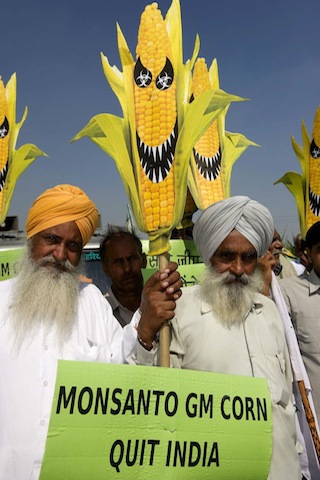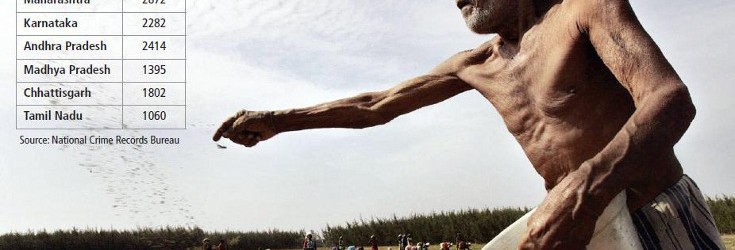Monsanto’s GMO Creations Caused 291,000 Suicides in India
Indian Farmers Facing Debt, Reliance on GMOs

It is no secret that Monsanto is making life difficult for countless farmers in America with its parented seeds. After all, the biotech giant has already filed 145 lawsuits, or on average about 9 lawsuits every year for 16 straight years, against farmers who have “improperly reused their patented seeds.” But did you know that Monsanto is also leading hundreds of thousands of farmers to suicide?
Biotech has attempted dismiss the rise in farmer suicides in India due to the introduction of genetically modified crops, but the problem is too pervasive to wipe under the rug. While there are numerous contributing factors to farmer suicides in India, debt is the largest concern, which is largely fueled by non-viable crops.
Biotech sells seeds that either don’t grow or lead to the development of unstoppable superweeds and superbugs. Subsequently, biotech urges and nearly forces farmers to purchase RoundUp and other herbicidal chemicals which the farmers can ill afford. Thus, the mind-numbing cycle begins. Read this post for more in-depth information.
What’s worse is that after a farmer commits suicide, the debt falls on the remaining family members. Monsanto, Dow, Bayer, and other suicide seed sellers have essentially created a generational slave economy based on their toxic chemical and seed monopolies.
According to figures outlining farmer suicide rates, 17,638 Indian farmers committed suicide in 2009 — about one death every 30 minutes. Oftentimes, the farmers would commit the act by drinking the very same insecticide that Monsanto supplied them with — a terrible end in which Monsanto has wrecked the lives of independent and traditional farmers.
Many families are now ruined thanks to the mass suicides, and are left to economic ruin and must struggle to fight off starvation:
‘We are ruined now,’ said one dead man’s 38-year-old wife. ‘We bought 100 grams of BT Cotton. Our crop failed twice. My husband had become depressed. He went out to his field, lay down in the cotton and swallowed insecticide.’
Now, Monsanto has caused a massive 291,000 suicides in India with its GMOs, chemical creations, and shameless business practices.
“. . . the motivations for these suicides follow a familiar pattern: Farmers become trapped in a cycle of debt trying to make a living growing Monsanto’s genetically engineered Bt cotton. They always live close to the edge, but one season’s ruined crop can dash hopes of ever paying back their loans, much less enabling their families to get ahead. Manjusha’s father, like many other suicide victims, killed himself by drinking the pesticide he spreads on his crops.”
In the video below, Dr. Vandana Shiva talks about the current situation in India and how GMO’s have affected farmers there. Dr. Shiva is an Indian environmental activist and anti-globalization author.


